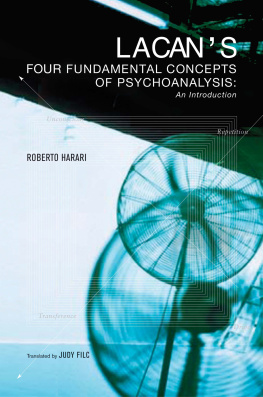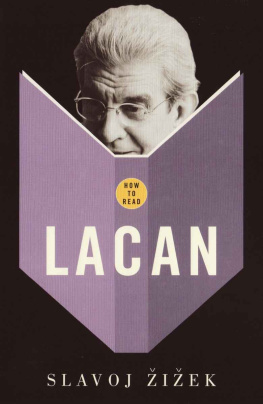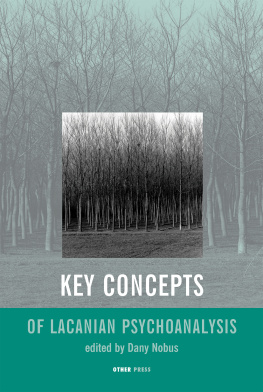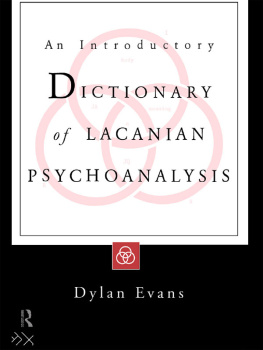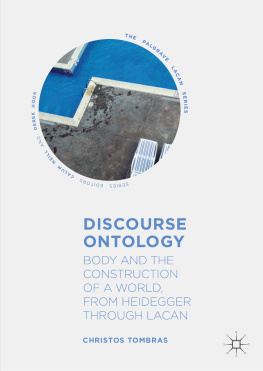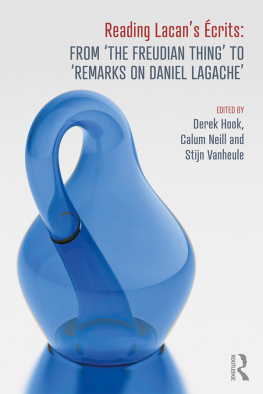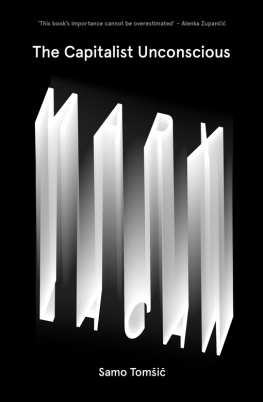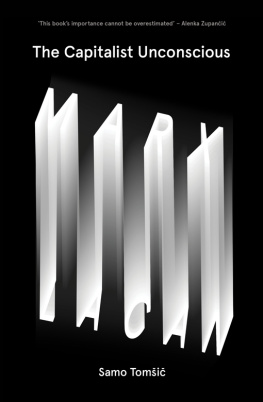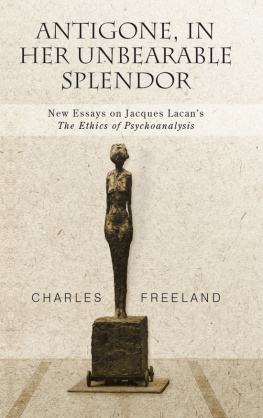Roberto Harari - Lacans Four Fundamental Concepts of Psychoanalysis
Here you can read online Roberto Harari - Lacans Four Fundamental Concepts of Psychoanalysis full text of the book (entire story) in english for free. Download pdf and epub, get meaning, cover and reviews about this ebook. year: 2020, publisher: Other Press, genre: Romance novel. Description of the work, (preface) as well as reviews are available. Best literature library LitArk.com created for fans of good reading and offers a wide selection of genres:
Romance novel
Science fiction
Adventure
Detective
Science
History
Home and family
Prose
Art
Politics
Computer
Non-fiction
Religion
Business
Children
Humor
Choose a favorite category and find really read worthwhile books. Enjoy immersion in the world of imagination, feel the emotions of the characters or learn something new for yourself, make an fascinating discovery.
- Book:Lacans Four Fundamental Concepts of Psychoanalysis
- Author:
- Publisher:Other Press
- Genre:
- Year:2020
- Rating:3 / 5
- Favourites:Add to favourites
- Your mark:
- 60
- 1
- 2
- 3
- 4
- 5
Lacans Four Fundamental Concepts of Psychoanalysis: summary, description and annotation
We offer to read an annotation, description, summary or preface (depends on what the author of the book "Lacans Four Fundamental Concepts of Psychoanalysis" wrote himself). If you haven't found the necessary information about the book — write in the comments, we will try to find it.
Lacans Four Fundamental Concepts of Psychoanalysis — read online for free the complete book (whole text) full work
Below is the text of the book, divided by pages. System saving the place of the last page read, allows you to conveniently read the book "Lacans Four Fundamental Concepts of Psychoanalysis" online for free, without having to search again every time where you left off. Put a bookmark, and you can go to the page where you finished reading at any time.
Font size:
Interval:
Bookmark:

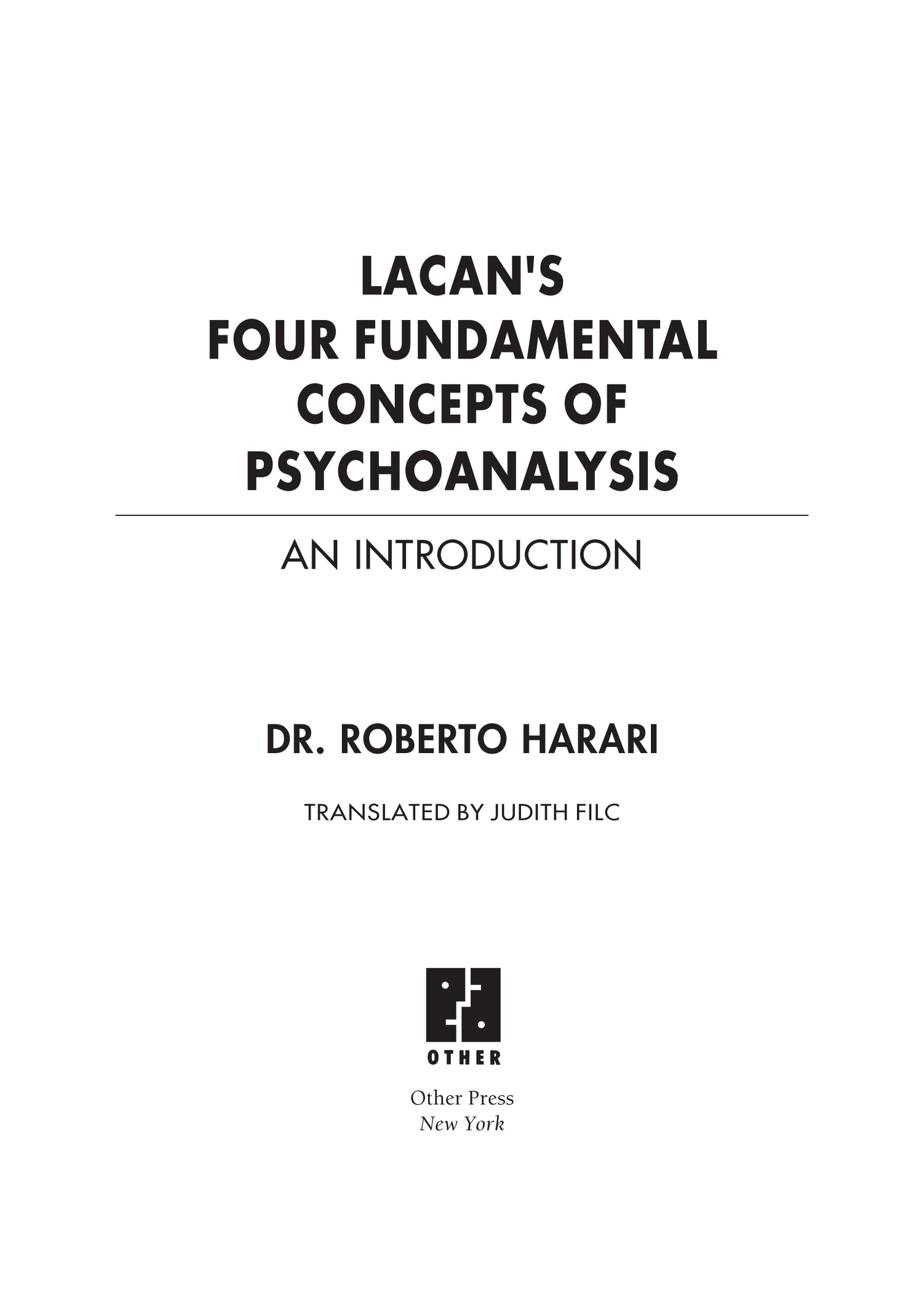
Copyright 2004 Roberto Harari
Translation copyright 2004 Judith Filc
Production Editor: Robert D. Hack
Ebook ISBN9781635421125
All rights reserved. No part of this publication may be reproduced or transmitted in any form or by any means, electronic or mechanical, including photocopying, recording, or by any information storage and retrieval system, without written permission from Other Press LLC, except in the case of brief quotations in reviews for inclusion in a magazine, newspaper, or broadcast. For information write to Other Press LLC, 267 Fifth Avenue, 6th Floor, New York, NY 10016. Or visit our Web site: www.otherpress.com
Library of Congress Cataloging-in-Publication Data
Harari, Roberto.
[Cuatro conceptos fundamentales de Lacan. English]
Lacans four fundamental concepts of psychoanalysis : an introduction / by Roberto Harari; translated by Judy Filc.
p. cm.
ISBN 978-1-59051-082-7 (pbk. : alk. paper)
1. Lacan, Jacques, 1901- Quatre concepts fondamentaux de la psychanalyse. 2. Psychoanalysis. I. Title.
BF173.L14623H3713 2004
150.195092dc22
2004005587
a_prh_5.5.0_c0_r0
To Jacques Lacan, atypical psychoanalyst, master of reading
Its a dismal thing to think of being master when one was never disciple.
F. de Rojas, La Celestina
Even though the purpose, scope, and thematic choices of this book have been made explicit quite often throughout the text, indicating the pertinence of their being heard as reiterated by the same emitter, it is important to detail the circumstances, the juncture, that made this book possible.
As you will see, the work responds both in style and organization to its oral originthe book constitutes the transcription of ten classes taught between April and August 1986 at the Center for Psychoanalytic Education (CPE) of the General San Martn Cultural Center, an agency of the Buenos Aires City Government. It is worthwhile highlighting the unheard-of character of the CPE, locally and maybe even worldwide. In 1984, under the protection of the return of democracy in Argentina and with the enthusiastic and unconditional support of the then brand-new secretary of culture for the city, Dr. Mario ODonnell, a heteroclite group of psychoanalysts gathered to work ad honorem at the San Martn Cultural Center.
This endeavor was actually the result of a proposition made by Dr. ODonnell as a response to an offer the psychoanalytic institution Mayutica-Institucin Psicoanaltica had made to him to collaborate with his secretariat. The proposition involved a manifold challenge. To begin with, since it should obviously be a pluralist endeavor, the CPEcoordinated by this writersummoned qualified colleagues who had never shared a working space before to join the project. Yet this was not the only factor creating uncertainty. Such space had to be built on nonconventional bases, insofar as the CPE posited not the classic, predictable paths taken by (and within) the analytic institutions, but the enactment of the links between psychoanalysis and culture, on the one hand, and the special consideration of the diverse nature of the Cultural Centers audience, on the other. Such diversity is due to the fact that the San Martn Cultural Center opens its doors gratis to anybody interested in the activities held there, regardless of their education, level of information, or professional training.
At the San Martn we received the frank and generous support of the Licenciado Javier Torre, who conferred to his work as director of the Cultural Center an impulse and creativity that rendered the Cultural Center one of the most significant of its sort worldwide, due to its power of appeal. I am deeply grateful to Dr. ODonnell and Lic. Torre, as I am to my colleagues in the CPEs organizing committee and to the numerous guests who continually added to the centers prestige. At least as important to the CPE were the attendants to our activities. Without the enticement of a certificate, with no predefined program, without the promise of specialized training, they fill seats, floors, and access hallways with truly outstanding constancy, attention, and interest. They are without a doubt the true instigatorsand main addresseesof the following pages, since they have never ceased to encourage me to give the classes taught at the CPE a publishable form (and even cordially insist that I do so).
Finally, if this endeavor became possible it was thanks to the Lics. Andrea Gmezs and Alejandra Cowess invaluable collaboration, the first one transcribing the lectures, and the second one editing the transcription for publication. To both, also, my sincere thanks.
I would also like to point out that only a few parts were deleted from the original, since my goal was to preserve the original conditions of its enunciation. The titles of the chapters represent the major topic of discussion during each class.
To conclude, a vow: that the reader will validate this Introduction as an acceptable attempt to establish with as much rigor as possible in the kingdom of lightswhich is not that of the Enlightenmentthe incomparable richness of the postmodern reading of Freud processed by Lacan. Such a reading, clearly sustainable for each psychoanalytic concept, is radically (raigalmente) put to the test when dealing, as we do here, with its very foundations.
Buenos Aires, June 1987
Title given in Spain and Latin America to those who finished a five-year undergraduate degree. (Translators note)
I want to thank you all for being here, since I never expected to have such a large audience; on my part, it will compel me to work arduously so that you continue to come. I dont believe such a large audience constitutes solely an acknowledgment of my own abilities; it also acknowledges Lacans teaching. Throughout our ten meetings, I will engage in an introductory discussion of some of the themes Lacan developed in his Seminar 11, The Four Fundamental Concepts of Psychoanalysis.
You will forgive me if I start with a truism, but sometimes redundancies are not superfluous. Of course, the view I can offer you of Seminar 11 is obviously partial, since on the one hand, a seminar such as this is impossible to encompass in ten meetings, and on the other, such reading will be, inevitably, my own approach to the text. What follows is a guiding principle to our reading: there is no exact or literal reading, but rather themes I consider crucial and about which others might say, How is it that he has barely touched on that point, or that he has skipped that other one? They will be right, as well. In any case, it is a principle whose function is to warn you as to what the development I intend to display in front of you will be like.
We may briefly situate the moment when Lacan teaches this seminar, both chronologically and in terms of the course taken by his teaching. To do this, we need to consider the politics of psychoanalysis, and particularly Lacans part in such politics. His role toward the official entity, the IPA, was indeed revulsive, repelling. He thus starts this seminar by referring to the excommunication he suffered on the part of the IPA. His use of such a term is certainly not random, since through its introduction he instantly refers to the religious question. We will see later how he will focus psychoanalysis on its relations with religion and science from the start, trying to identify, if possible, and delimit the respective epistemological borders, to say it along with Gaston Bachelard.
Font size:
Interval:
Bookmark:
Similar books «Lacans Four Fundamental Concepts of Psychoanalysis»
Look at similar books to Lacans Four Fundamental Concepts of Psychoanalysis. We have selected literature similar in name and meaning in the hope of providing readers with more options to find new, interesting, not yet read works.
Discussion, reviews of the book Lacans Four Fundamental Concepts of Psychoanalysis and just readers' own opinions. Leave your comments, write what you think about the work, its meaning or the main characters. Specify what exactly you liked and what you didn't like, and why you think so.

